Investigating anti-predator properties of bacterial multispecies biofilm communities
This project aims to explore inter-kingdom interactions between bacteria and protozoa
Project Type: Master
In nature, microorganisms such as bacteria, archaea, fungi, or single-celled eukaryotes live and interact in various microenvironments. These inter-microbial interactions impact fitness and survival and are highly diverse. They include competition for the same nutrient source or predation between two organisms, antagonism, such as the production and secretion of bioactive compounds, and synergism, like sharing public goods or using metabolic waste products from other species. This project aims to explore inter-kingdom interactions between bacteria and protozoa.
Most bacteria live in biofilms, whereby they gain plenty of advantages. In biofilms, bacterial cells are embedded in a self-produced matrix. Such biofilms are generally assembled by multiple members, provide local niches, allow cell specializations, and promote inter-species interactions. Furthermore, the individual members of a biofilm community are more protected against bioactive compounds or predators than planktonic cells would be since the biofilm functions as a shield. We hypothesize that bacteria present in a multispecies biofilm are better protected against phage predation due to the properties of the biofilm matrix.
In the Section of Microbiology, we use a four-species bacterial model community displaying synergistic features. We aim to understand the inter-species dynamics between the four members with various approaches, such as genetic manipulation, bioinformatic analyses, phenotypic assays, microscopy, and proteomic analyses. Additionally, we would like to extend our focus and investigate predatory interactions between our bacterial model community and bacteria-grazing protozoa.
In this project, we will expose the wild-type bacterial model community and different community variations, including specific biofilm mutants, to bacteria-grazing protozoa. The aims will be to explore the protection abilities of biofilms against protozoa and to examine the impact of specific biofilm matrix components.
The project will be conducted at the Section of Microbiology at Nørre Campus in Copenhagen. We have a diverse lab environment with researchers focusing on various aspects of microbiology and a high level of interproject interactions. You will have a day-to-day supervisor in the lab that will assist you with practical and scientific tasks and ensure your smooth transition into the group. The project is flexible and will be well-suited for a microbiology or biochemistry student interested in microbiology and microbial ecology. Do not hesitate to contact us for more information, and feel free to come by and have a chat about how to shape the project to match your interests.
For more information, please contact:
Mette Burmølle, E-mail: burmolle@bio.ku.dk
Heiko T. Kiesewalter, E-mail: heiko.kiesewalter@bio.ku.dk
READ MORE AT: https://www1.bio.ku.dk/english/research/microbiology/
Topics
Section of Microbiology

Contact Mette Burmølle
 Professor
Professor
Mette Burmølle
Section of Microbiology
Universitetsparken 15, build. 1, 1. floor
DK-2100 Copenhagen
E-mail: burmolle@bio.ku.dk
Contact Heiko T. Kiesewalter
 Postdoc
Postdoc
Heiko Kiesewalter
Section of Microbiology
Universitetsparken 15, build. 1, 1. floor
DK-2100 Copenhagen
E-mail: heiko.kiesewalter@bio.ku.dk

